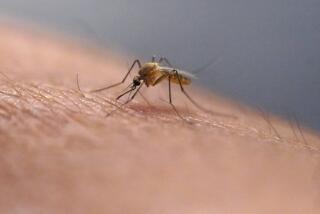Disease Scare Has Floridians Taking Cover : Health: Encephalitis, borne by mosquitoes, cancels evening outings. The first frost has cooled some of the alarm.
- Share via
MIAMI — A tiny mosquito that carries a potentially fatal disease has disrupted evening activities and thrown a scare into millions of people throughout much of Florida in recent months.
Since August, 68 people have been infected and three have died from St. Louis encephalitis in Florida’s worst outbreak of the insect-borne disease in 13 years. The three deaths occurred within the last three weeks among residents of Central Florida who were 58 or older, state health officials said.
Encephalitis has been found in 23 of Florida’s 67 counties, from the north-central part of the state to just south of Miami.
While panic would be too strong a word to describe reaction to the outbreak, alarm is not. In much of the state, traditional Friday night high school football games have been shifted to afternoons. Makers of insect repellents have waged special advertising campaigns and stepped up shipments to Florida. Motorists who stop at Florida welcome centers get an advisory on the disease.
Theme parks in the Orlando area, including Disney World, have increased aerial spraying of insecticides and are warning guests to take precautions against mosquitoes. Disney spokesman Rod Madden said that although attendance and operating hours at Disney World, Epcot Center and Disney-MGM Studios are normal, swimming areas are closing early and nightly water pageants in front of the hotels have been suspended.
In many communities, Halloween was celebrated over the weekend. Youngsters who plan to be out after dark Wednesday were being encouraged to wear long-sleeved costumes. In Ft. Lauderdale, at least one mall invited children--and their parents--to trick-or-treat indoors, from store to store.
“We’re just urging common sense,” said Ruben Betancourt of the state Department of Health and Rehabilitative Services. “We’re telling people to go out on Halloween early, before it gets dark.”
The concern about nightfall reflects epidemiologists’ warnings that the virus-carrying Culex nigripalpus mosquito--one of about 70 species in Florida--is active only after dark. Since the first encephalitis fatality was reported two weeks ago, mosquito traps in various areas of the state have found the population of C. nigripalpus to be relatively small, representing no more than 5% of all mosquitoes, according to Marlon Nelms of the Dade County (Miami) Mosquito Control Division. And, he said, very few of those are carriers.
“You can walk the dog, get the mail and have no concern,” said Nelms. Reaction to the outbreak, he added, “was a little overblown,” especially in the Miami area, where only one case of encephalitis has been confirmed.
Yet, in a state where mosquitoes and mosquito bites are common, the risk is real, officials caution.
Encephalitis is an inflammation of the brain with symptoms that mimic a severe case of flu. Most people who get the St. Louis strain recover, but it can threaten the lives of people with weak immune systems, such as the elderly and children, health officials warn.
Some of the danger seemed to abate late last week, when the first cold front of the season brought frost to the northern reaches of the state and 50-degree temperatures to South Florida. Insects not killed by the cold were at least slowed, according to Nelms.
Still, even with a brisk wind blowing on Miami Beach on Monday, hotels such as the famed Fontainebleau Hilton continued to warn arriving guests not to linger outside after dark. The 2,500 conventioneers at the National Pest Control Assn.’s annual meeting were taking heed.
“These people aren’t afraid of pests,” said group spokesman Joel Paul, “but we moved our opening reception inside. We’re a cautious association. We don’t walk into beehives, either.”
More to Read
Sign up for Essential California
The most important California stories and recommendations in your inbox every morning.
You may occasionally receive promotional content from the Los Angeles Times.













